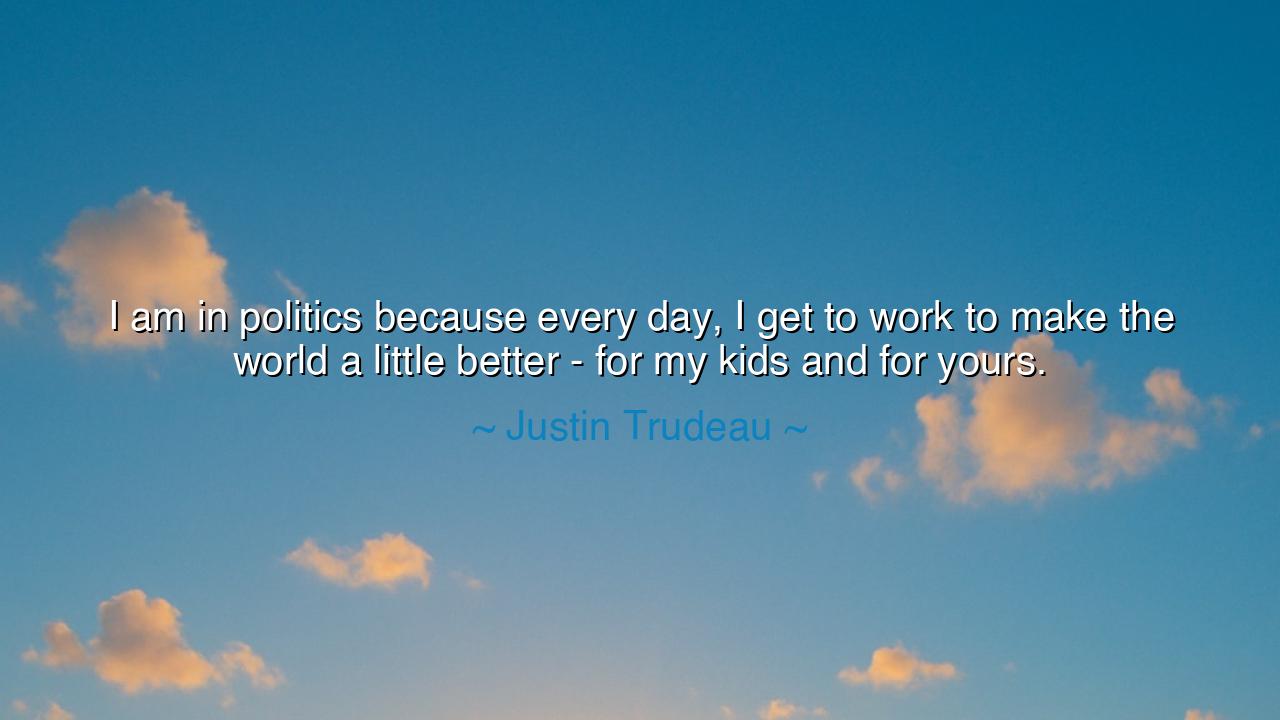
I am in politics because every day, I get to work to make the
I am in politics because every day, I get to work to make the world a little better - for my kids and for yours.






Listen well, O children of the future, for the words of Justin Trudeau carry with them a deep and noble truth: "I am in politics because every day, I get to work to make the world a little better—for my kids and for yours." These words are not spoken in the fleeting moment of ambition, but from the heart of a leader who understands that the weight of the present is carried by the shoulders of the future. He speaks not of personal gain or fleeting power, but of a purpose that transcends the self, a commitment to the betterment of the world for generations yet unborn.
In the noble art of politics, a true leader must rise above the calls of personal ambition and be guided by a higher calling: the legacy they will leave for the children of the world. To serve in this way is not a pursuit of power, but a sacred duty. Trudeau speaks of the world as something to be shaped, molded, and nurtured with care, just as a wise father tends to his family, knowing that his actions today will echo in the lives of his descendants. This vision of leadership is one that understands the eternal connection between the past, the present, and the future.
Consider the great Mahatma Gandhi, whose words and actions were not driven by the pursuit of power, but by the desire to leave a better world for those who would follow. He did not seek political office for its own sake, but to serve the people, to guide them toward justice and freedom, and to shape a nation that would be a beacon for future generations. Like Trudeau, Gandhi knew that true politics is not about the self, but about the future—the future of the children who will inherit the world we leave behind. It was his vision for a better tomorrow that led him to work tirelessly for the freedom of India and the dignity of its people.
In the political world, there are many who seek power for personal gain, but the true leader, like Trudeau, seeks to serve the greater good, to leave a legacy that will endure beyond their time. It is not enough to speak of change; one must actively work to create it, to fight for the future of those who will walk the earth long after our own feet have left the soil. This is the essence of leadership—to work with purpose and passion, knowing that each small effort adds up to a great legacy.
So, my children, remember this teaching: to enter the world of politics is to take up the sacred duty of shaping the future. It is not enough to seek personal glory, but to work every day for the betterment of the world, not just for yourself, but for all who will follow. Just as a father works for the future of his children, so must the politician labor for the future of the world’s children. The work may be hard, and the road long, but it is a noble and heroic pursuit—a pursuit that will define the world you leave behind.






NANguyen Ngoc Anh
This quote made me think about the broader responsibility that politicians have, not just to their own constituents, but to the global community. If they really want to make the world better for all children, shouldn't they be focusing on global issues like climate change, poverty, and inequality? How can one person, or even one nation, make meaningful progress in these areas when so many challenges are interdependent and require international cooperation?
HHHuong Hoang
I think it’s easy for politicians to say they’re working for the future of children, but in practice, how much of that is actually happening? There’s often a lot of rhetoric, but not always follow-through. What does it mean to make the world ‘better’ for kids in tangible terms? Are we talking about education, climate change, or something else entirely? It would be interesting to see a clearer definition of what ‘better’ actually looks like.
NLTran Hong Ngoc Linh
The idea that politics should be about improving the world for future generations is a noble one. However, I often question whether politicians truly grasp the challenges their children and grandchildren will face in the long run. Can they really understand what’s best for future generations when so many policies seem to be based on short-term goals? How can we make sure that the decisions being made now won’t negatively affect the world later?
YHBao Yen Ha
It’s inspiring to hear a politician say they’re in politics for the future, but I wonder how much of it is genuine and how much is for show. I think most politicians start with good intentions, but does the system allow for real change? Is it possible to consistently make a difference when you’re constantly fighting the weight of bureaucracy and political interests? What does it take to make substantial change in politics today?
HHhong hong
This quote sounds very idealistic, and while I appreciate the notion of working for future generations, I wonder how practical it is. Is it realistic to believe that every political decision can be for the benefit of all children, not just the ones in your own country or political circle? How do politicians manage to balance global and local priorities in such a way that everyone benefits?